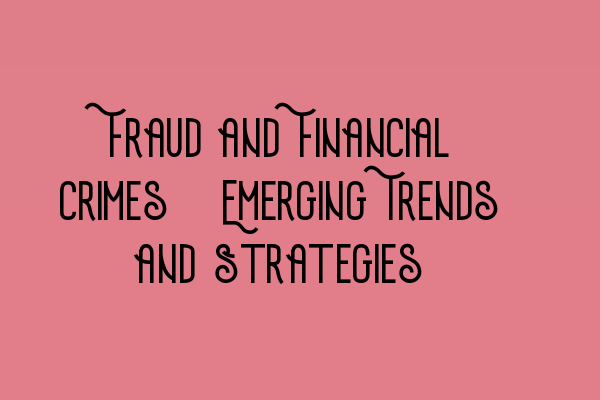Fraud and Financial Crimes: Emerging Trends and Strategies
As solicitors at SQE Criminal Law & Practice Law UK, we are constantly staying updated on the emerging trends and strategies related to fraud and financial crimes. In today’s digital age, fraudsters and financial criminals have become increasingly sophisticated in their tactics, making it vital for legal professionals to be well-informed and prepared. In this blog post, we will discuss the latest trends in fraud and financial crimes and provide strategies to combat them effectively.
1. Cybersecurity Threats
With the rapid advancements in technology, cybercrime has become one of the most significant threats in the fraud landscape. Hackers and cybercriminals are constantly finding new ways to exploit vulnerabilities in systems and networks. It is crucial for individuals and businesses to prioritize cybersecurity measures to protect themselves from data breaches, identity theft, and financial fraud.
SQE 2 Preparation Courses can equip solicitors with the necessary knowledge and skills to handle cybercrime cases effectively. Understanding the technical aspects of cybersecurity, such as encryption, network security, and incident response, can be invaluable in building solid legal arguments and defending clients.
2. Money Laundering
Money laundering continues to be a significant concern in the financial sector. Criminals use various methods to conceal the origins of illicit funds and make them appear legitimate. As solicitors, it is our responsibility to stay updated on anti-money laundering (AML) regulations and strategies.
SQE 1 Preparation Courses offer comprehensive training on AML laws and compliance. Solicitors with a strong understanding of AML regulations can help businesses implement robust compliance programs, conduct risk assessments, and ensure the proper reporting of suspicious transactions.
3. Insider Trading
Insider trading remains a prevalent form of financial fraud, with individuals using non-public information to gain an unfair advantage in trading securities. From an enforcement perspective, prosecuting insider trading cases can be complex and challenging.
By staying abreast of SRA SQE Exam Dates, solicitors can ensure they are up to date with the latest developments in insider trading regulations and case law. SQE 1 Practice Exam Questions can also be an excellent resource for solicitors to sharpen their legal analysis and reasoning skills in these types of cases.
4. Fraudulent Schemes
Fraudsters continuously devise new fraudulent schemes to trick individuals and businesses out of their money. From Ponzi schemes to investment fraud, staying ahead of these schemes requires legal professionals to understand the psychology behind them.
SQE 1 Practice Mocks FLK1 FLK2 can test solicitors’ knowledge and understanding of different fraudulent schemes. By identifying patterns and trends, solicitors can build strong cases to prosecute fraudsters effectively.
5. International Cooperation
With advancements in technology and globalization, financial crimes often involve multiple jurisdictions. Solicitors must have a solid understanding of international cooperation mechanisms and legal frameworks to effectively combat cross-border fraud.
Continuous professional development through SQE preparation courses can help solicitors remain updated on international cooperation agreements, extradition laws, and mutual legal assistance treaties.
In conclusion, fraud and financial crimes are constantly evolving, requiring solicitors to stay updated on emerging trends and strategies. By investing in SQE preparation courses and staying abreast of relevant resources, solicitors can effectively combat fraud and financial crimes, and ensure justice for their clients.
